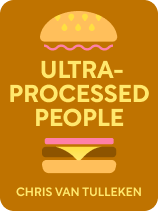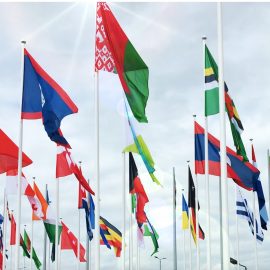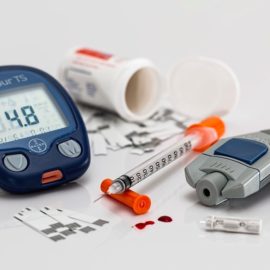

This article is an excerpt from the Shortform book guide to "Ultra-Processed People" by Chris van Tulleken. Shortform has the world's best summaries and analyses of books you should be reading.
Like this article? Sign up for a free trial here.
How can governments and individuals fight the effects of ultra-processed foods? In what ways should marketing for UPFs be changed?
Most food is processed to some extent. Even baking bread or making a smoothie in the blender are forms of processing. But ultra-processed food is different. Ultra-processing doesn’t just modify food—it transforms food into something else entirely.
Here’s what can be done to fight against the prevalence of UPFs.
Fighting the Negative Effects of Ultra-Processed Food
We have the power to counteract the negative effects of ultra-processed foods. In this article, we first examine Dr. Chris van Tulleken’s contention from Ultra-Processed People that governments should regulate UPF—not by banning it, but by taking other measures to limit its consumption. Next, we discuss his suggestion that we eat less UPF or stop eating it altogether.
Government Regulation of UPF
Van Tulleken advocates three primary methods for regulating UPF: prohibiting government policymakers from taking money from the food industry, labeling UPF products accurately, and restricting UPF marketing.
Governments Should Be Prohibited From Taking Money From the Food Industry
The food industry heavily influences government policies. Various “nutritional” foundations exist for the primary purpose of shaping food policy—and they’re funded by an array of UPF companies. Much of the research critical of the link between UPF and health problems is funded by or affiliated with companies that produce UPF.
Yet the data is clear, says van Tulleken, that when an industry funds science, the results are biased in favor of the industry. He argues that the UPF industry should be divorced from scientific research into the effects of UPF, and that government policy shouldn’t be funded—directly or indirectly—by the food industry.
(Shortform note: Van Tulleken repeatedly points out how UPF manufacturers can prejudice research and policy in their favor, yet he also acknowledges the challenges inherent in decoupling government and the food industry. This is partly because research—particularly large-scale studies on humans—is expensive, and transnational UPF companies have significantly more money available to fund these studies than many of the other relevant players. This is often the case with scientific research. According to the Organisation for Economic Co-operation and Development (OECD), more than 60% of research and development in scientific and technical fields is conducted by industry, with 20% performed by universities and 10% by government.)
Governments Should Label UPF Products Accurately
Van Tulleken argues that labeling would help the public make informed choices about what they’re buying. He points to Chile, where three-quarters of adults are overweight or obese. There, the government implemented a policy requiring labeling on food products high in calories, sugar, sodium, and saturated fat. The labeling resulted in fewer food purchases.
(Shortform note: As of 2024, 10 countries (including eight Latin American countries, Canada, and Israel) have implemented or are in the process of implementing mandatory front-of-package warning labels for certain unhealthy foods. The labels must warn about excess levels of sugar, saturated fat, and sodium; in some countries, they also must warn about excess calories and trans fats. One issue with this approach, however, is that focusing on “bad” ingredients overlooks UPF that doesn’t have an excess of these ingredients but still causes health problems as a result of the processing itself—products such as various sugar-free, fat-free candies, cookies, and salad dressings. Nonetheless, there is usually a high correlation between these ingredients and UPF.)
Governments Should Restrict Marketing of UPF
Marketing is a huge portion of the budget for most UPF. UPF companies often aggressively market their products to low-income communities, sometimes with disastrous results.
For example, in the 1970s, Nestlé targeted poor mothers in developing countries by sending saleswomen dressed as “nurses” into their communities to promote the supposed nutritional benefits of baby formula over breastfeeding. Yet Nestlé knew, or should have known, that many of these communities did not have access to clean water, forcing caregivers to mix the formula or wash the bottles with contaminated water. Nestlé’s practices were linked to thousands of infant deaths.
Van Tulleken argues that to prevent this type of predatory marketing, governments should implement rules for how companies market all UPF.
(Shortform note: In Fast Food Nation, journalist Eric Schlosser describes another way UPF companies aggressively market their products to susceptible consumers: by marketing to kids. Thanks to companies like McDonald’s, which started the practice with its Happy Meals and the Ronald McDonald mascot, by the 2000s there was an entire subset of the advertising industry devoted to fostering brand loyalty in children. UPF companies use bright colors, cartoon characters, toy and movie tie-ins, and even deals with school districts to aggressively promote and sell fast food and other unhealthy UPF to kids. Many countries now restrict marketing of junk food to kids, an approach that’s proven largely successful.)
Choosing Not to Eat UPF
It’s difficult for individual consumers to effect change on a systemic level simply by shopping differently, especially since many people in low-income communities don’t have access to non-UPF foods.
However, if you want to effect change on an individual level and have access to minimally processed foods, van Tulleken suggests experimenting with eating less UPF or cutting it out entirely. He advises going on an 80% UPF diet for a few days, armed with the knowledge you now have about how UPF affects our health. Pay attention to how you feel and whether certain foods feel more addictive to you. (If you think you’re addicted to UPF, get help from a doctor or talk to someone about it.) You may want to adopt a diet where you eat some UPF but avoid whatever makes you feel bad or causes you to overeat. You may want to stop eating UPF altogether.
(Shortform note: Michael Pollan agrees that the best way to reclaim our health from our current industrialized diet is to stop eating UPF. His In Defense of Food provides additional detail about not only what we shouldn’t eat, but also what we should eat instead. Pollan says we should avoid food with more than five ingredients, food containing high-fructose corn syrup, packaged food with health claims on the label, and industrialized meats and produce. He says we should eat real food, which he defines as whole food or food containing ingredients your great-grandmother would recognize. He argues that we should eat mostly green plants, avoiding meat except in small amounts. Finally, we should eat a variety of fruits and vegetables for their diverse nutrients.)

———End of Preview———
Like what you just read? Read the rest of the world's best book summary and analysis of Chris van Tulleken's "Ultra-Processed People" at Shortform.
Here's what you'll find in our full Ultra-Processed People summary:
- Why it’s so hard to stop eating your favorite chips
- How the way ultra-processed food is made harms the environment
- Ways to counteract the effects of ultra-processed food






